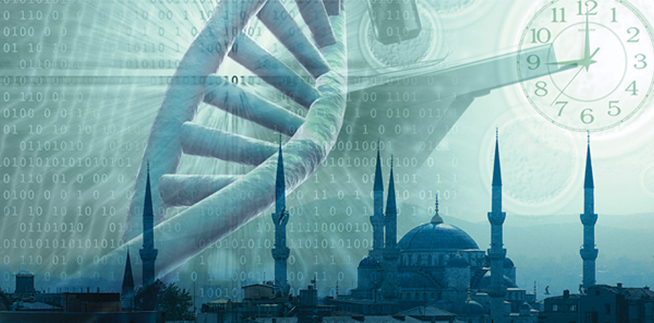Justin Pahl

The debate over science and religion - whether they're compatible or whether they're irrevocably at odds with one another - has been waged for quite some time now. Some of the loudest voices - most recently in a Slate article by Jerry A. Coyne titled "No Faith in Science" - have been dogmatic in their adherence to the belief that there is no room in science for faith.
Such dogmatism, strangely enough, sounds an awful lot like religious fundamentalism - blanket assertions that leave no room for doubt or deviation from rigid doctrine.
And it's also not necessarily true or beneficial. There are plenty of people who believe, strongly, that science and faith aren't just compatible, but that, to solve some of the largest problems facing today's world, they must work together.
People of faith, though presently a minority, have long been well represented within the natural sciences. This is true not just historically - Copernicus, Galileo, and Newton were all devout Christians - but in contemporary times, too. Writing for the C.S. Lewis Foundation, Robert C. Fay shows that,
Michael Faraday, James Joule, Lord Kelvin, and James Clerk Maxwell, for example, were all devout Christian believers. In the 20th Century, the astronomer Arthur Eddington, Charles Towns and William Phillips, Nobel laureates in physics, and Francis Collins, the director of the Human Genome Project, have publicly affirmed their belief in God.
Islam also has a long history of great scientists, from the ancient mathematician Omer Khayyam to the modern day chemist, Omar M. Yaghi.
There are many organizations exploring and developing the conciliatory "science and religion" movement. Starting in the mid-90s, the Berkeley-based Center for Theology and the Natural Sciences has hosted conferences on the confluence of science and faith. Pepperdine University has hosted its Christian Scholars Conference, which studies the intersections of faith and science, for over thirty years. Since 2001, Calvin College has hosted lectures on "Christian Perspectives in Science," which has featured a wide range of speakers - climate scientists from the University of Washington, agronomists from Purdue, the leader of Christian Reformed World Relief Committee - who have discussed the ways that science and faith can work together to combat climate change, hunger, and poverty.
Recently in November 2013, The Fountain hosted a conference in Istanbul that brought together religious scholars and scientists - a former Boeing engineer turned rabbi; a devout Muslim who is also a rocket scientist at MIT - to discuss a similar range of issues. The speakers elaborated on the ways that science and faith support one another, instead of the ways they conflict. Ozgur Koca, an adjunct professor at Claremont College, explained that faith is a way of viewing the entire world as sacred, and is thus an injunction to both study the world, and protect it.
Why, when so many people are advocating for a more unified approach, are the voices opposing such co-operation given so much attention?
In some ways, the question is one of context and definition. In Western science, which has mostly developed in countries where the separation of church and state is a codified part of life, this binary view of major systems is quite common. But in many other cultures, this binary doesn't exist. It's entirely possible that scientific research, which has mostly flourished in the wealthier countries in North America and Europe, has been affected by this cultural tendency towards "separation."
This is not to say that there aren't major differences, some of which may be irreconcilable. It also isn't fair to make false equivalencies. Natural science, based on meticulous observation and rigorous examination of the material world, is different than the faith that one feels when contemplating the larger meaning of the universe, and the metaphysical texts that explore this meaning. But is it unrealistic to think that one could, and maybe even should, support the other?
Let me put it more simply: would a believer hesitate to use an antibiotic developed by an atheist? Do scientists discount the work of the human genome project because Francis Collins said, "When something new is revealed about the human genome, I experience a feeling of awe at the realization that humanity now knows something only God knew before…"?
There are serious problems that we, as a human species, are facing: climate change and hunger on a massive scale, crippling wars and crushing poverty. Many people of science and faith are motivated by the same underlying desire - to begin solving these problems and to make this world a better, more humane place. Christian aid organizations can use modern agronomy to help improve crop yields in Africa. Muslims can use their faith as an impetus to study scientific means for developing more sustainable forms of energy production.
It's possible, or even likely, that devout scientists and devout believers won't agree on the very biggest questions of the universe - its origins and ultimate fate. In the meantime, those of us in the vast middle - people who possess some kind of religious faith and also an acceptance of scientific discoveries - can utilize both to improve the very small slice of that universe we actually inhabit. Instead of a dangerously exclusive dichotomy, we can practice a productive, respectful, unity.









